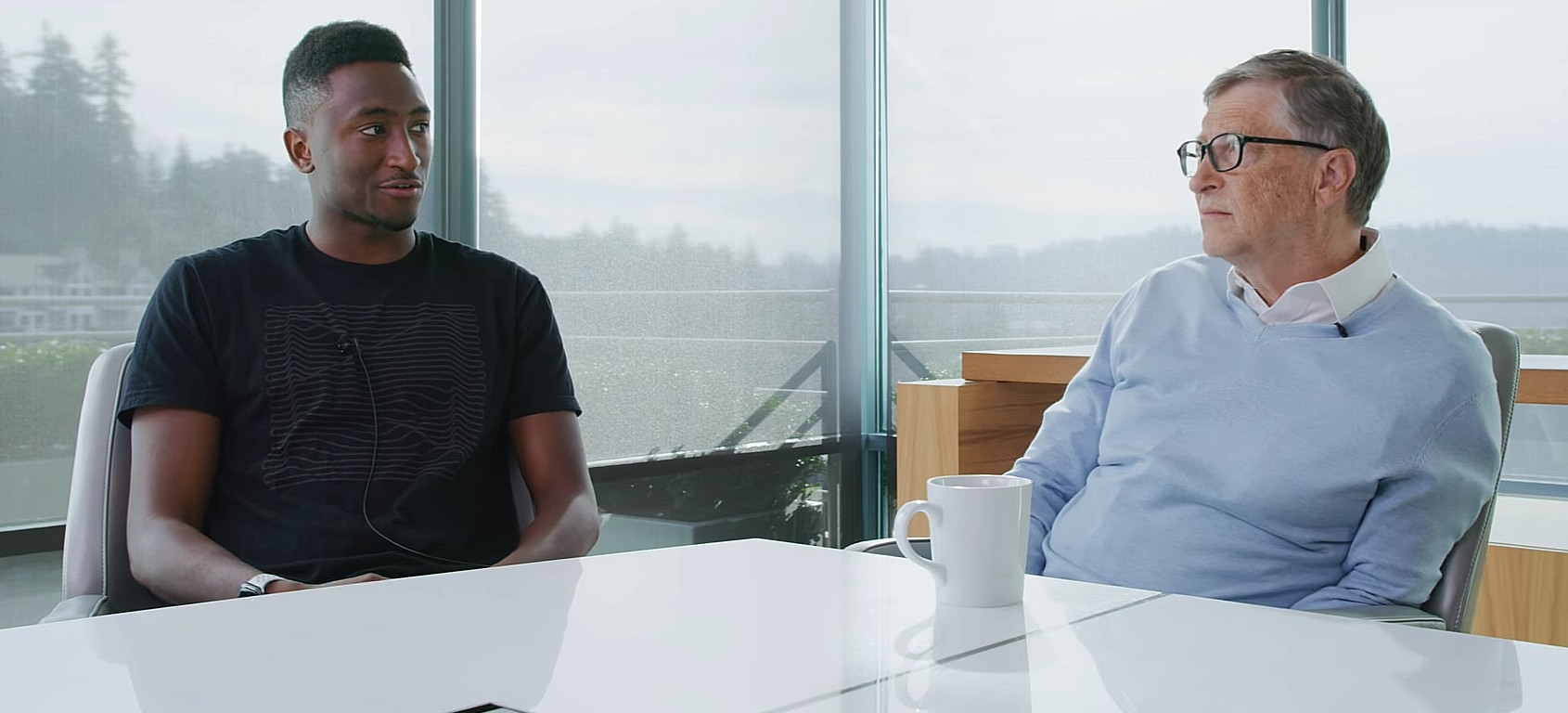
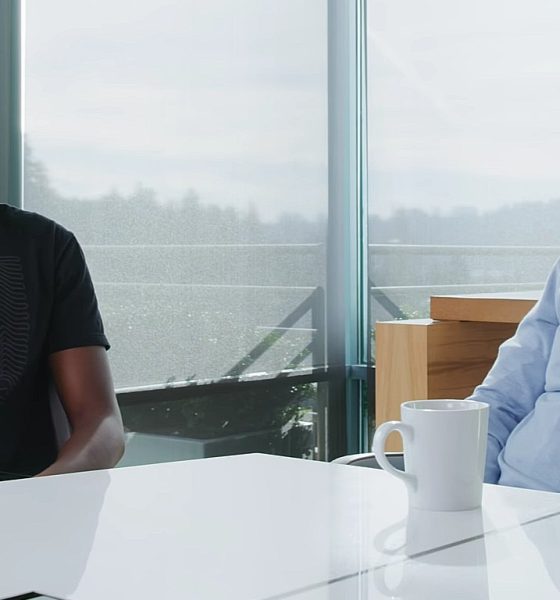
News
Bill Gates shares insights on Tesla and all-electric trucks in MKBHD interview
In a recent, brief interview with YouTube tech reviewer Marques Brownlee, billionaire-philanthropist Bill Gates talked about his views on electric vehicles such as Tesla, as well as his thoughts on emissions from the transportation sector. In the short conversation, the Microsoft co-founder praised Tesla’s electric cars, though he also admitted that there is still a lot that needs to be done to make transportation significantly cleaner.
Bill Gates is no stranger to Tesla’s vehicles. Back in 2016, the tech titan was filmed driving casually in a Tesla Model X with Seveneves author Neal Stephenson. Referring to the Silicon Valley-based electric car maker in his recent interview; Gates pointed out that Tesla’s vehicles are “amazing,” while stating that the company still has a long road ahead. The Microsoft co-founder also noted that car buyers would soon have more electric vehicles to choose from.
“Tesla is an amazing product that’s catching on, but it’s still a pretty small percentage of the market. It’s a premium price vehicle, and they lost their $7,500 tax credit, so it’s making it tougher. Now, a ton of other manufacturers are gonna come in, partly because the California zero emissions and partly because people see these trends. There will be a lot of great electric cars to choose from,” Gates said.
Unfortunately, Bill Gates still appeared to be quite cautious with the idea of batteries being used for the long-haul market. The billionaire-philanthropist further added that electric cars would not be fully emissions-free until the grid becomes completely independent of fossil fuels.
“(For) passenger cars — the power output you need is lower than for a truck. So eventually, batteries might work for a truck, but it’s a far more difficult problem because the weight is a lot higher there. Even those passenger cars, one thing to be careful of is unless the electric has gotten to zero, the electric car is still an emitter because of the indirect emissions from the electricity it uses. And so, only in the places where you both get the electric cars to a high percentage and you get the electric sources to be zero emissions, then you’ve got that passenger transport car piece near to zero,” Gates said.
While the Microsoft co-founder has a valid point regarding his concerns about electric vehicles, it should be noted that EVs are cleaner than fossil fuel-powered cars even if the electricity used to charge them comes mainly from coal. This point was highlighted in a recent study from Bloomberg NEF, which concluded that carbon dioxide emissions from battery-powered vehicles are 40% lower than those from cars equipped with internal combustion engines, even in areas that are reliant on coal such as China.
The billionaire-philanthropist also appears to be discounting the progress in battery technology that have been accomplished by companies such as Tesla. Over the past year, Elon Musk hinted that Tesla is already closing in on the $100 per kWh mark, which would help the company’s electric cars achieve price parity with gas-powered vehicles. Battery tech has also progressed to a point where the Tesla Semi, an upcoming all-electric long-hauler, has been noted to feature closer to 600 miles per charge. So compelling are the improvements in batteries that even companies such as Nikola Motor, which has sworn by hydrogen-electric tech, have decided to release battery-powered variants of its upcoming trucks.
Based on Bill Gates’ statements in his interview with Marques Brownlee, it appears that it would still take some time before he fully warms up to the idea of battery-powered vehicles serving as potential catalysts for the world’s transition towards sustainable energy. Considering Tesla’s progress over the years, it might only be a matter of time before the Microsoft co-founder fully embraces electric cars.
Watch MKBHD’s interview with Bill Gates in the video below.

News
Tesla Model Y Performance Review: The Best Trim of the Best Vehicle?
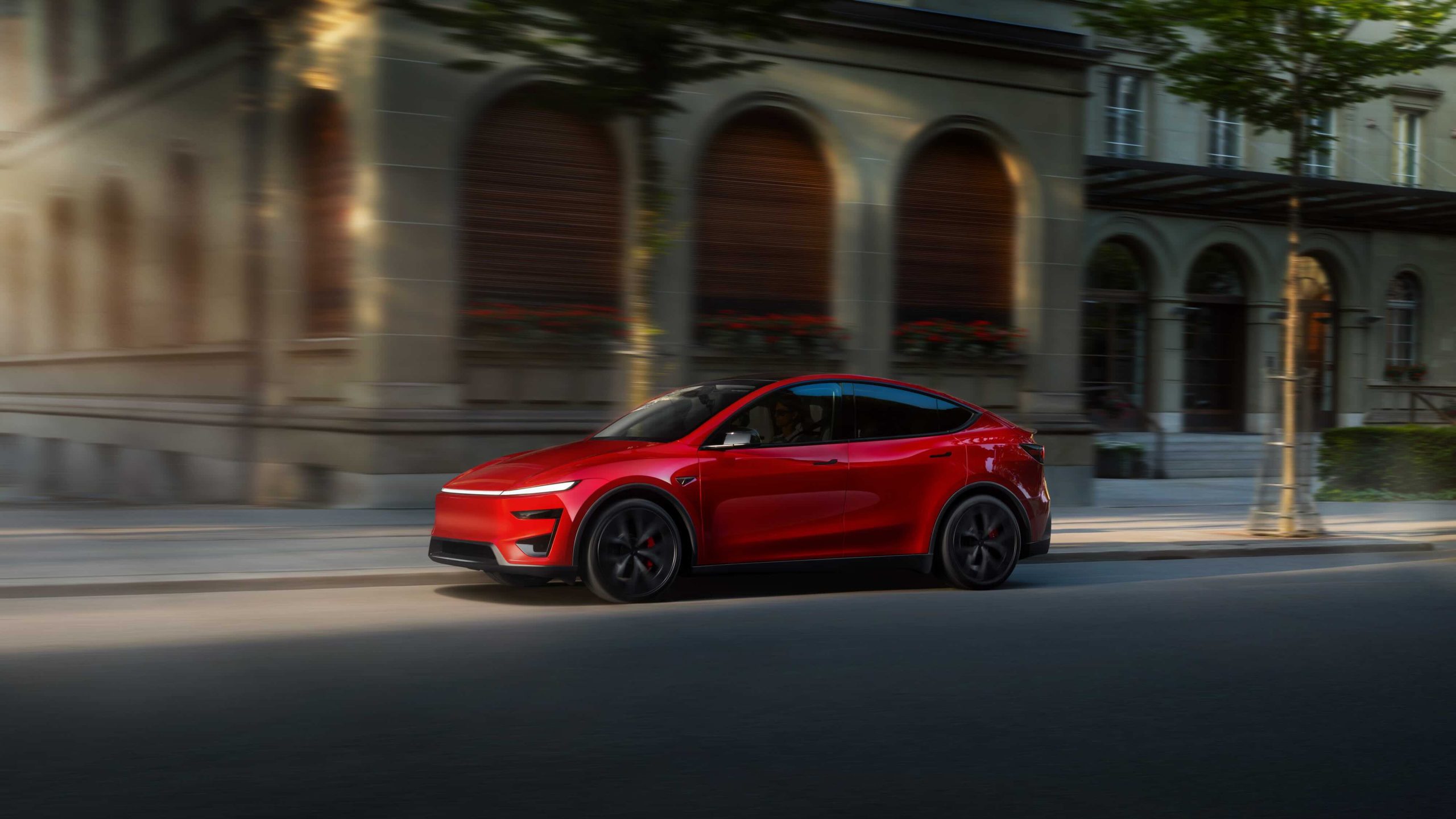
The Tesla Model Y Performance was in my hands for seven days after the company reached out and got me a brand new unit. As a Premium All-Wheel-Drive owner, I was really interested to see if the Performance trim was worth the $11,000 difference, and what I learned might be a surprise.
The only “performance” version of any Tesla vehicle I’ve had the opportunity to have several days with was the Cyberbeast back in June, and a few days with that made me want a Cybertruck more than I already did. It had white-knuckle speed, and as someone who truly loves to drive a larger vehicle, it fit the bill for everything I wanted out of an electric pickup.
We picked up the Tesla Model Y Performance yesterday!
We have a whole SEVEN days with it and we want to do anything you’d like us to (within reason) with it!
Let us know below 👇 what you’re interested in knowing pic.twitter.com/BRG9nOSwGW
— TESLARATI (@Teslarati) January 20, 2026
With that past experience, I was truly excited to try the new Model Y Performance, especially considering I own a Model Y already, and after six months of ownership, it has truly won me over as the best car I’ve ever owned. Although my 2008 Ford Escape Hybrid is a close second, mostly due to nostalgia and it being my “dream car” as a kid in high school at the time, the Model Y is unequivocally better, obviously. It’s hard to shake the feelings of your first “nice” car; I think we could all relate to that in a way.
First charge in the Tesla Model Y Performance!
This is a v2 Supercharger, so not quite as fast as what we’d like, but it will do for now. pic.twitter.com/Akyb2BLMcS
— TESLARATI (@Teslarati) January 21, 2026
Before I even picked up the Model Y Performance, I was expecting a handful of things: better performance, better handling, more comfortable seats, and a thirst for spirited driving on the windy backroads of Southern Pennsylvania. Admittedly, a snowstorm disrupted a lot of my testing, but I was still able to have some fun in the car.
With that being said, my thoughts are sure to potentially ruffle some feathers.
First Impressions of the Tesla Model Y Performance
I picked up the Model Y Performance on January 19 and had it for one week. The Ultra Red paint with the White interior option was a great look, and it was fun to have a car with that look, considering my Model Y is Black on Black.
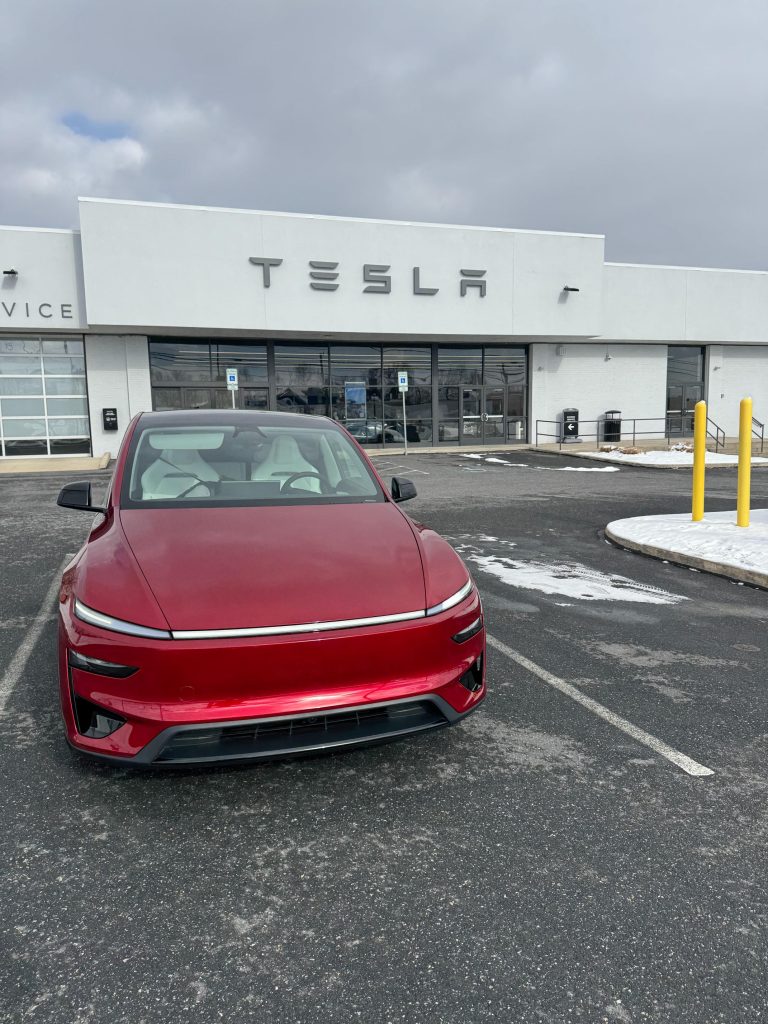
One thing that is really interesting and somewhat surprising is that Tesla hasn’t adjusted the fact that the Ultra Red is a different shade than the Performance brake calipers. Additionally, the rear light bar, which signals braking, is a different shade of red than the car and the brake calipers.
This was something that the Tesla Showroom employees pointed out to me, and, just like they said, I’ll never be able to not see it.
Interior Quality
The first thing I noticed was the Performance seats, which are geared to hug you a tad more and keep you intact during spirited drives. They were, without a doubt, more comfortable than the seats in my Premium AWD.
Interestingly, when I gave this opinion on X, some Performance owners said that the seats were less comfortable and, on longer drives, I’d feel it. My Fiancè and I drove about 120 miles in the car that weekend, and we had no complaints. They were supremely comfortable, and we both really enjoyed them, almost to the point that we’d rather have those seats than the ones in the Premium AWD.
🚨 Tesla Model Y Performance White Interior is 🔥
This seriously might be the best Tesla out there pic.twitter.com/BnSe1GJqqi
— TESLARATI (@Teslarati) January 22, 2026
Additionally, the center screen is slightly larger, but not to the extent that I had really noticed any true difference. In the new Model Y for 2026, the screen is the same size as the one in the Performance trim at 16 inches.
It was previously 15.4 inches.
Some other changes include Performance pedals that are made of what appears to be a stainless steel alloy and Carbon Fiber accents on the doors and dash. Other than that, there are no significant differences; it’s very similar to the other Premium trims of the Model Y. The big difference from an interior standpoint is simply the front seats.
Exterior Differences
Tesla used a lot of different techniques to help improve performance and aerodynamics, including a carbon fiber spoiler and rear diffuser, both of which help with air displacement and improve handling, range, and overall performance.
These additions are clean and give the car a sporty look, perfectly catered to the aesthetic Tesla was obviously going for with the car. I’ve already mentioned the brake calipers, which are an awesome touch, but the offsetting tones of red between them and the paint are a bit displeasing to the eye. I hope this is something that is resolved, but it isn’t completely necessary, nor a priority.
The Nitty Gritty – Ride Quality and Performance
With all the changes from an aesthetic standpoint, including the ones that are geared toward improving performance, the real indicator of whether this trim is worth the extra $11,000 is simple: Is it faster and more fun to drive than the Premium All-Wheel-Drive?
I’m going to break that down here:
Speed and Acceleration
There is a slightly noticeable difference in acceleration, as the 4.6-second 0-60 MPH on the AWD is 1.3 seconds slower than the 3.3-second rate on the Performance. Although that sounds like a decent difference, the big change I noticed was the sound. In the Performance, you can really hear those motors hum, which was a nice touch and really interesting and fun to experience.
It was definitely quicker than my AWD, but I think I really expected to be thrown back into my seat like I was with the Cyberbeast, which features a 2.6-second 0-60 MPH acceleration rate. That was truly a massive difference that anyone can really feel. The 1.3-second difference between the AWD and Performance was, in a way, underwhelming.
I was not disappointed with it, but I really hoped to feel that same rush of adrenaline I had with the Cyberbeast. I think I’m just so used to the acceleration at this point that it does not “wow” me any longer. At the time of the Cyberbeast Demo Drive, I was still driving a gas car.
The Performance, like the AWD, is very capable. It’s great for merging on the highway and getting into a tight window when traffic is heavier. It’s great for taking some quicker drives, and it’s a lot of fun to take out on the road. By no means am I disappointed with it, but I will say maybe my expectations were a tad too high.
Handling
This is where I will say I was sort of disappointed, because I have heard from many people that the suspension is better in the Model Y Performance compared to the All-Wheel-Drive.
I didn’t really feel like it was “better,” but the same, which is still an absolutely amazing ride experience. My AWD is great for tight turns at increased speeds, where I felt the difference was in the seats, as those Performance ones truly did seem to “hug” me more and keep me more stable.
The Performance trim features adaptive suspension, lower/stiffer springs, and larger wheels, all of which are meant to improve handling. I’m not sure if it is simply because I didn’t get to push it as much as I wanted to due to weather, but I felt like the feel of the ride was really similar to my AWD. I had no complaints.
Overall Thoughts
The Model Y Performance is definitely a sportier look than the AWD and Standard models, and it definitely has its advantages. I think that it’s a really great car, but I did not feel an incredible number of differences from the AWD.
🚨 ONE WEEK with the Tesla Model Y Performance: Review and Initial Thoughts
We didn’t get to have as much fun as we wanted in the MYP due to the snow storm, but we were able to give some initial thoughts on the car with the little bit of reasonable weather we had pic.twitter.com/C75WQMNHKO
— TESLARATI (@Teslarati) January 27, 2026
There was a lot to love: the seats, the look, the acceleration. The latter is something that is definitely great if you plan to take your car to a track, but for public roads, it’s not something that is a substantial “need.” When I pushed it on a road local to me and posted a video of it, the commenters were sure to tell me I was going too fast.
I want to be clear that I have zero complaints about the Model Y Performance, and if it were to have come out ahead of me getting my AWD, I probably would have entertained the idea if I could have made the numbers work.
The Model Y, from Standard to Premium, is a great car in every sense of the word. The ride quality is great, the build quality is excellent, and the interior and exterior features, as a whole, make it the best car in the world (to me).
Elon Musk
Elon Musk explains why Tesla’s 4680 battery breakthrough is a big deal
Tesla confirmed in its Q4 and FY 2025 update letter that it is now producing 4680 cells whose anode and cathode were produced during the dry electrode process.
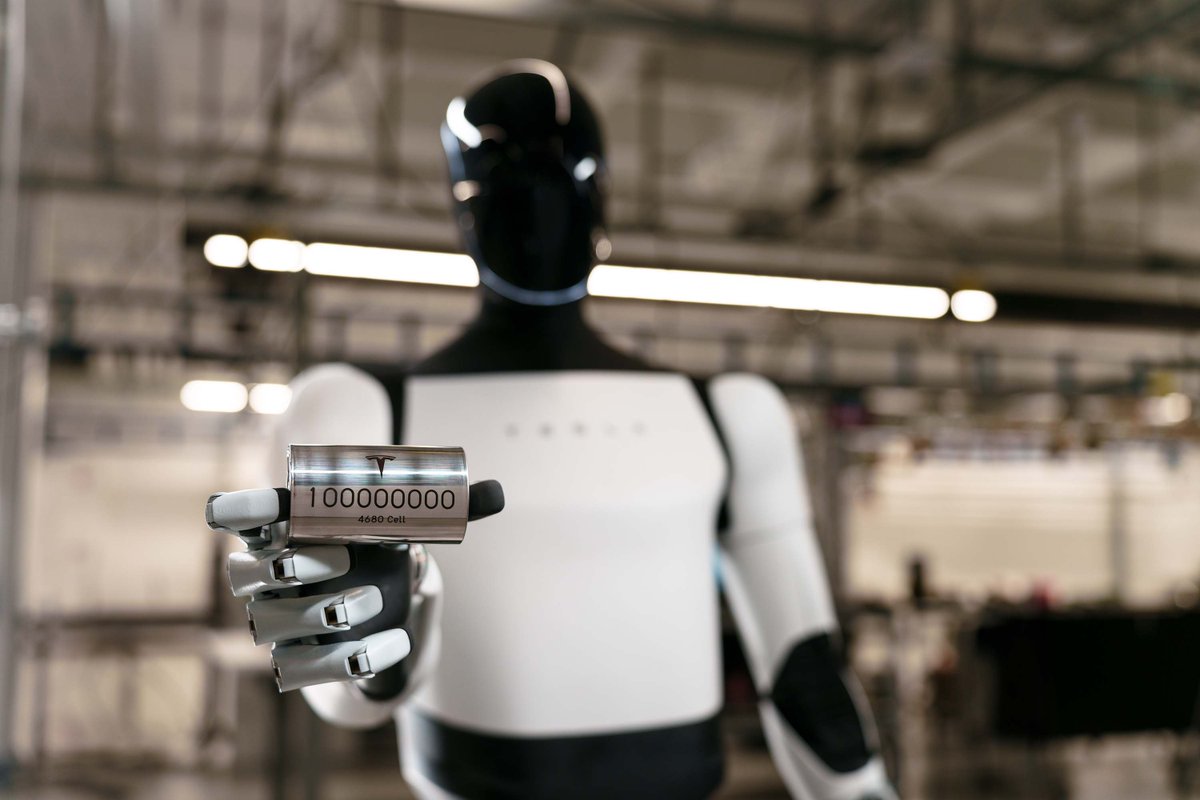
Tesla’s breakthroughs with its 4680 battery cell program mark a significant milestone for the electric vehicle maker. This was, at least, as per Elon Musk in a recent post on social media platform X.
Tesla confirmed in its Q4 and FY 2025 update letter that it is now producing 4680 cells whose anode and cathode were produced during the dry electrode process.
Why dry-electrode matters
In a post on X, Elon Musk stated that making the dry-electrode process work at scale was “incredibly difficult,” calling it a major achievement for Tesla’s engineering, production, and supply chain teams, as well as its partner suppliers. He also shared his praise for the Tesla team for overcoming such a difficult task.
“Making the dry electrode process work at scale, which is a major breakthrough in lithium battery production technology, was incredibly difficult. Congratulations to the @Tesla engineering, production and supply chain teams and our strategic partner suppliers for this excellent achievement!” Musk wrote in his post.
Tesla’s official X account expanded on Musk’s remarks, stating that dry-electrode manufacturing “cuts cost, energy use & factory complexity while dramatically increasing scalability.” Bonne Eggleston, Tesla’s Vice President of 4680 batteries, also stated that “Getting dry electrode technology to scale is just the beginning.”
Tesla’s 4680 battery program
Tesla first introduced the dry-electrode concept at Battery Day in 2020, positioning it as a way to eliminate solvent-based electrode drying, shrink factory footprints, and lower capital expenditures. While Tesla has produced 4680 cells for some time, the dry cathode portion of the process proved far more difficult to industrialize than expected.
Together with its confirmation that it is producing 4680 cells in Austin with both electrodes manufactured using the dry process, Tesla has also stated that it has begun producing Model Y vehicles with 4680 battery packs. As per Tesla, this strategy was adopted as a safety layer against trade barriers and tariff risks.
“We have begun to produce battery packs for certain Model Ys with our 4680 cells, unlocking an additional vector of supply to help navigate increasingly complex supply chain challenges caused by trade barriers and tariff risks,” Tesla wrote in its Q4 and FY 2025 update letter.
News
Even Tesla China is feeling the Optimus V3 fever
As per Tesla China, Optimus V3 is “about to be unveiled.”
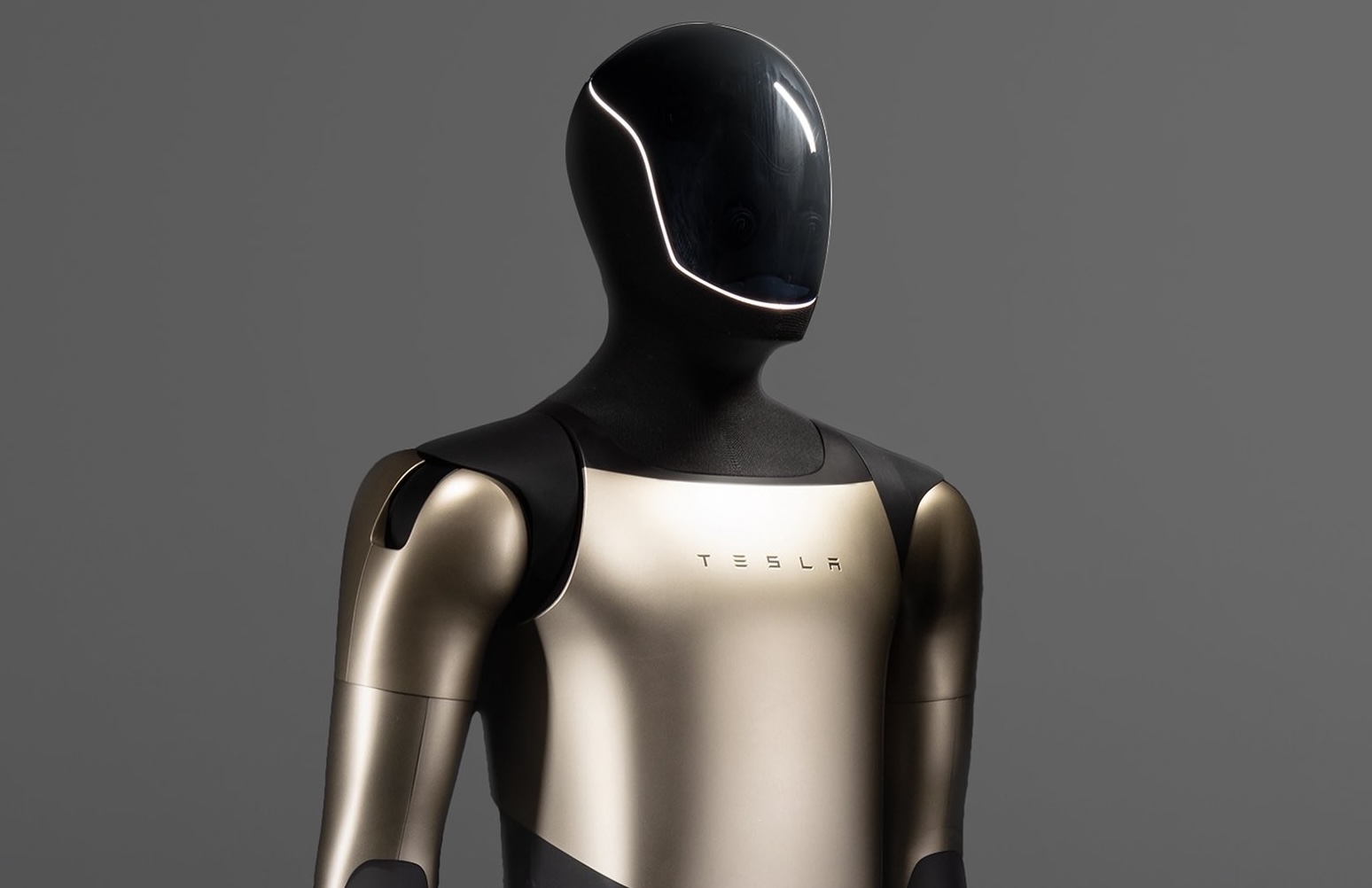
Even Tesla China seems to have caught the Optimus V3 fever, with the electric vehicle maker teasing the impending arrival of the humanoid robot on its official Weibo account.
As per Tesla China, Optimus V3 is “about to be unveiled.”
Tesla China hypes up Optimus V3
Tesla China noted on its Weibo post that Optimus V3 is redesigned from first principles and is capable of learning new tasks by observing human behavior. The company has stated that it is targeting annual production capacity of up to one million humanoid robots once manufacturing scales.
During the Q4 and FY 2025 earnings call, CEO Elon Musk stated that Tesla will wind down Model S and Model X production to free up factory space for the pilot production line of Optimus V3.
Musk later noted that Giga Texas should have a significantly larger Optimus line, though that will produce Optimus V4. He also made it a point to set expectations with Optimus’ production ramp, stating that the “normal S curve of manufacturing ramp will be longer for Optimus.”
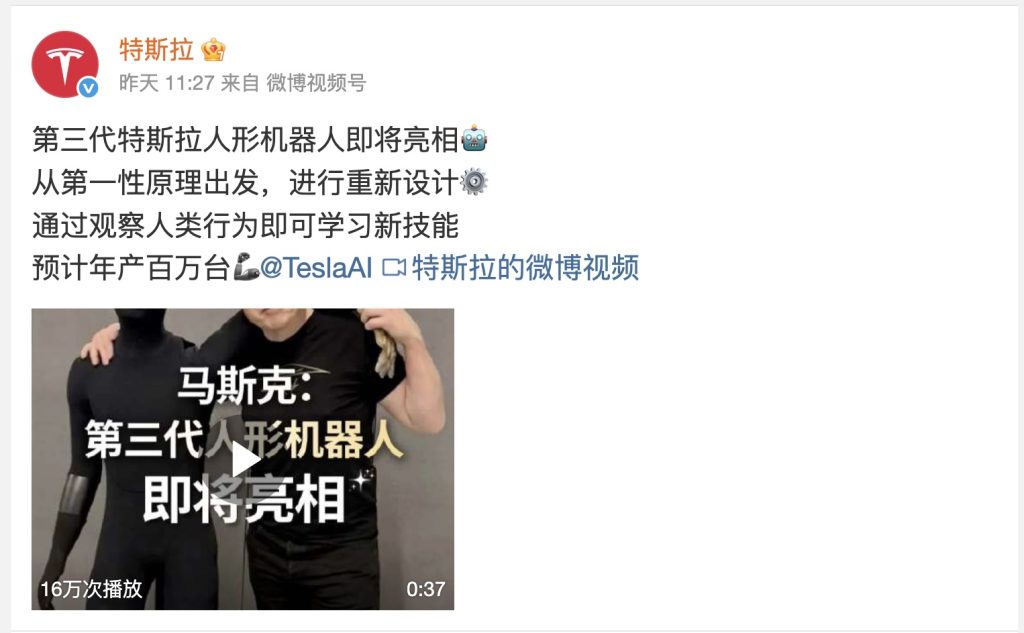
Tesla China’s potential role
Tesla’s decision to announce the Optimus update on Weibo highlights the importance of the humanoid robot in the company’s global operations. Giga Shanghai is already Tesla’s largest manufacturing hub by volume, and Musk has repeatedly described China’s manufacturers as Tesla’s most legitimate competitors.
While Tesla has not confirmed where Optimus V3 will be produced or deployed first, the scale and efficiency of Gigafactory Shanghai make it a plausible candidate for future humanoid robot manufacturing or in-factory deployment. Musk has also suggested that Optimus could become available for public purchase as early as 2027, as noted in a CNEV Post report.
“It’s going to be a very capable robot. I think long-term Optimus will have a very significant impact on the US GDP. It will actually move the needle on US GDP significantly. In conclusion, there are still many who doubt our ambitions for creating amazing abundance. We are confident it can be done, and we are making the right moves technologically to ensure that it does,” Musk said during the earnings call.








